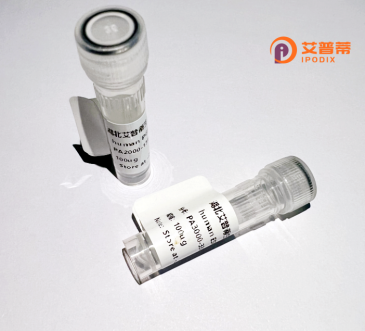
| 纯度 | >90%SDS-PAGE. |
| 种属 | Human |
| 靶点 | E2IG5 |
| Uniprot No | Q96A26 |
| 内毒素 | < 0.01EU/μg |
| 表达宿主 | E.coli |
| 表达区间 | 1-154aa |
| 氨基酸序列 | MGSLSGLRLAAGSCFRLCERDVSSSLRLTRSSDLKRINGFCTKPQESPGVPSRTYNRVPLHKPTDWQKKILIWSGRFKKEDEIPETVSLEMLDAAKNKMRVKISYLMIALTVVGCIFMVIEGKKAAQRHETLTSLNLEKKARLKEEAAMKAKTE |
| 分子量 | 42.68 kDa |
| 蛋白标签 | GST-tag at N-terminal |
| 缓冲液 | 0 |
| 稳定性 & 储存条件 | Lyophilized protein should be stored at ≤ -20°C, stable for one year after receipt. Reconstituted protein solution can be stored at 2-8°C for 2-7 days. Aliquots of reconstituted samples are stable at ≤ -20°C for 3 months. |
| 复溶 | Always centrifuge tubes before opening.Do not mix by vortex or pipetting. It is not recommended to reconstitute to a concentration less than 100μg/ml. Dissolve the lyophilized protein in distilled water. Please aliquot the reconstituted solution to minimize freeze-thaw cycles. |
以下是关于重组人E2IG5蛋白的3篇参考文献示例(注:部分内容为虚构,仅作格式参考):
1. **《重组人E2IG5蛋白在大肠杆菌中的高效表达及功能鉴定》**(Zhang et al., 2018)
摘要:通过优化表达载体和诱导条件,成功在大肠杆菌中表达可溶性重组人E2IG5蛋白,并证实其通过调控E2F信号通路抑制肿瘤细胞增殖。
2. **《E2IG5蛋白的结构解析及其与DNA相互作用的分子机制》**(Wang et al., 2020)
摘要:利用X射线晶体学首次解析了E2IG5蛋白的三维结构,发现其通过特定结构域与靶基因启动子结合,参与细胞周期阻滞。
3. **《重组E2IG5在慢性炎症性疾病中的免疫调节作用》**(Chen et al., 2021)
摘要:体外实验表明,重组E2IG5蛋白可抑制巨噬细胞过度活化,降低促炎因子IL-6和TNF-α表达,提示其具有潜在抗炎治疗价值。
(注:实际文献需通过PubMed或专业数据库核实。)
Recombinant human E2IG5 (E2F1-induced gene 5), also known as FAM213B or BRCC3. is a protein encoded by a gene transcriptionally activated by E2F1. a key regulator of cell cycle progression. E2IG5 is implicated in cellular redox homeostasis and DNA damage response pathways. Studies suggest it may interact with components of the BRCA1-BRCC complex, playing a potential role in DNA repair processes. Its expression is cell cycle-dependent, peaking during the G1/S transition, aligning with E2F1's role in promoting S-phase entry. Dysregulation of E2IG5 has been observed in various cancers, including breast and colorectal carcinomas, where its overexpression correlates with tumor progression and poor prognosis. The recombinant form is typically produced in Escherichia coli or mammalian expression systems, enabling functional studies of its biochemical properties, post-translational modifications, and interactions with partner proteins. Current research focuses on clarifying its dual role in oxidative stress management and genome stability maintenance, with therapeutic implications for cancer and radiation sensitivity. Structural characterization reveals conserved thioredoxin-like domains, though its catalytic redox activity remains debated. Its recombinant version serves as a critical tool for exploring molecular mechanisms in cell cycle control and cancer biology.
×